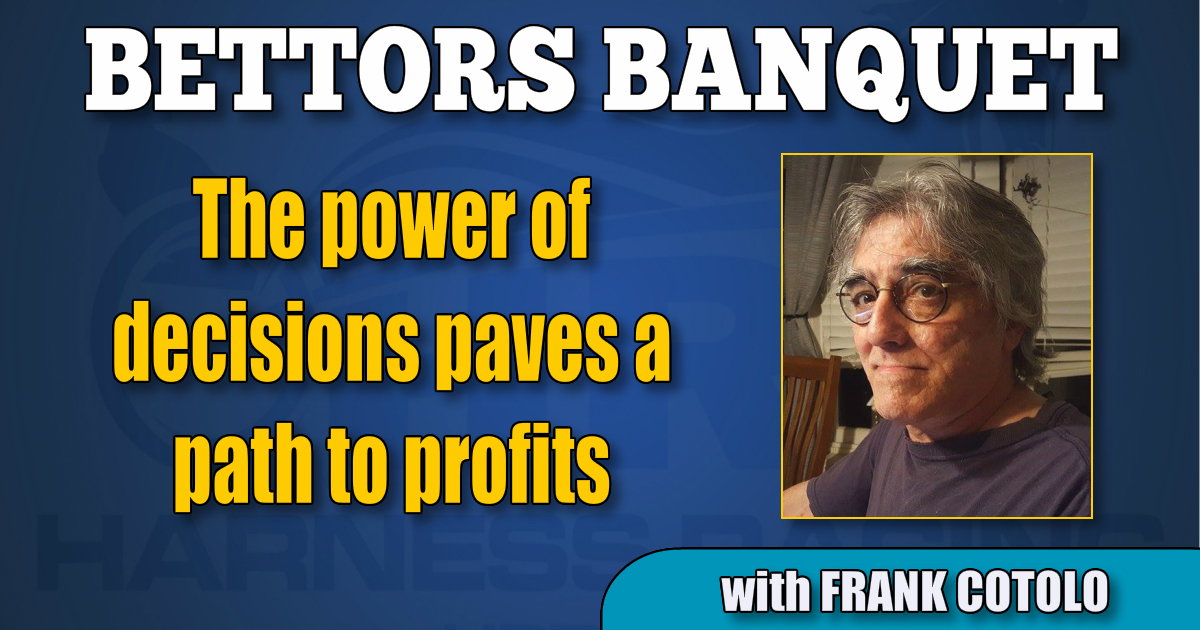The power of decisions paves a path to profits
by Frank Cotolo
One of the smartest betting rules is: Make decisions, not selections.
It sounds ridiculous, right? Picking winners is a handicapper’s goal. You play the horse you pick to win. The more winners, the more money you make. But handicappers also choose second and third selections; they just do not bet them over a winning pick. They never decide to do that, they never understand that it is more important to decide, not select, which to bet, even though it’s a rule that governs smart play.
At this time of the season — with the last week of Red Mile Grand Circuit racing the overture to the Breeders Crown — no advice for bettors is more pivotal for getting the smartest results from your personal handicapping (more about that later, now, about that rule).
Such a rule would be a significant shift in how you handicap and wager, correct? Then ask yourself if you believe joke number one or joke number two:
Joke one:
“How do you stop a runaway horse?”
“I do not know. How do you stop a runaway horse?”
“Bet on it.”
Joke two:
“How do you cash on a double-digit winner?”
“I don’t know, how do you cash on a double-digit winner?”
“Bet on it.”
I dislike jokes that cast horseplayers as hopeless, perpetual losers. It is an insult to the motivations of a horseplayer — to make money topples the common, losing image. After all, there are people making money at the racetrack. I knew some, and they had this much in common — when it came to wagering, they made decisions, not selections. They inspired me.
Nothing proves success like success, so, years ago at a racetrack where I bet as a full-time job, I came upon a race where I had three contenders. One was going off a favorite, another was the public’s third choice, and the third was 40-1. I questioned my evaluation of the 40-1 shot as a contender because I thought him worth far less. I recalled the bettors’ rule, so I refused to dismiss the 40-1 shot as a contender and decided to bet on it, even though, by post time, it was going off 50-1. It won and paid $102.60, so I became a decider, never to pick a winner again.
The rule redefined “longshot” and “value” for my betting purposes, as well as it assisted me in passing races with unlimited risk based upon my price demands. A longshot became the best win price (in my opinion, translated to odds) for one of my contenders. Value was its price about my opinion. It meant that I would lose more races but make more money on my winners in “the long run.”
I also learned that decisions, not selections, were especially potent in high-caliber stakes — like the very events coming this week at Red Mile and in a few weeks when the Breeders Crown emerges at Hoosier Park — where the best of the divisions filled each elim and final fields.
Though I continued to play overnight races, the impact of my decisions offered lesser win prices I felt were deserved. In the stakes events, however, I began to excel capturing strong “value” for the kinds of horses the public supported too mildly.
The most recent example of this is Ramona Hill. At 2, she was dismissed in the Breeders Crown Two-Year-Old Filly Trot Final at Woodbine Mohawk Park with odds of approximately 14-1. She was my win-bet decision, paying an astounding $31.80. Another Ramona Hill decision surfaced in the 2020 Del Miller Final at the Meadowlands, which she won, paying $18.80.
Decisions like those allowed for making money after subtracting losses from total plays. The process was especially helpful because decisions, not selections, reduced the number of overall races I wagered upon. Indeed, I was like most bettors when picking winners, playing — to coin a phrase from the late, great Dick Mitchell, “anything that moved” in order to toss some kind of profit. If there is any caveat to the claim of making money from decisions, not selections, it is important to note it is the sole product of win betting and a mighty reduction of overall wagers.
Through the 2000s so far, my best decisions in major stakes races resulted in double-digit wins, including (in no particular order) Charley Barley, Artists View, Poof Shes Gone, Broad Bahn, Impressive Kent, Tommi Canu Hear Me, Perfect Spirit (placed first, Hambletonian), Mets Hall and many more.
Yes, of course, there were bad decisions also, losses, but there were also many races passed, more races than I ever passed before (stakes and overnights). Mostly, though, the difference between losing and winning comes down to a simple truth: it does not matter how many tickets you cash, it only matters what the tickets you cash are worth.

















